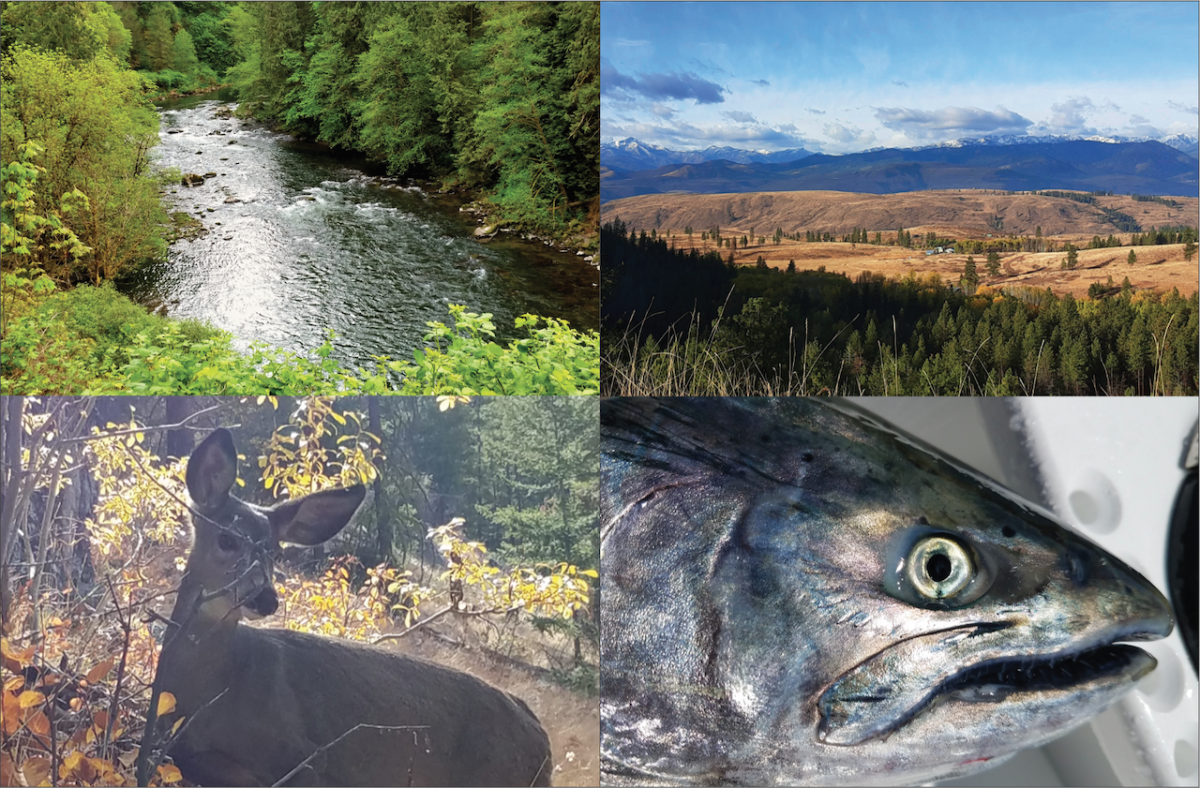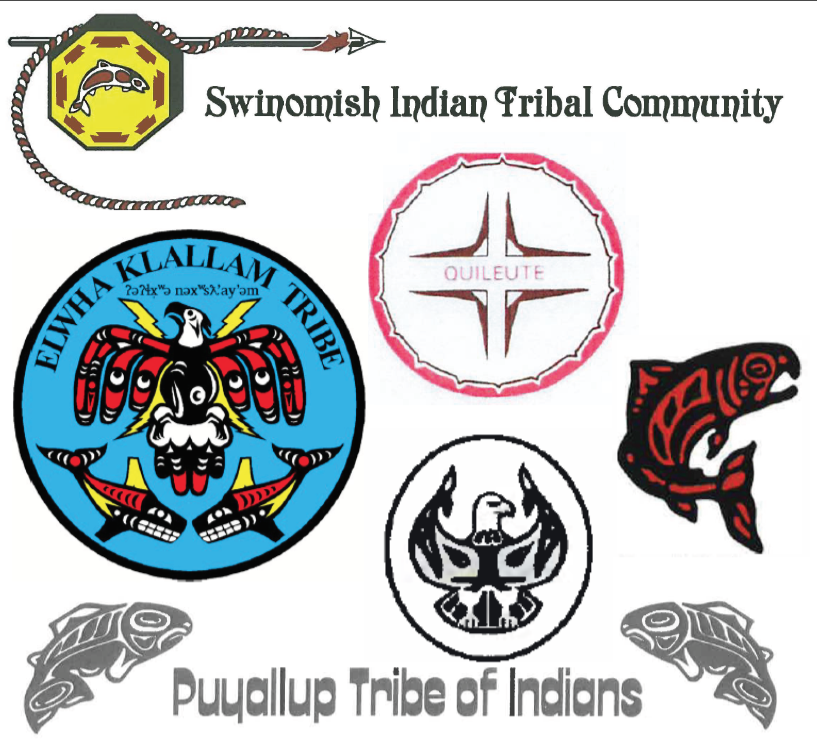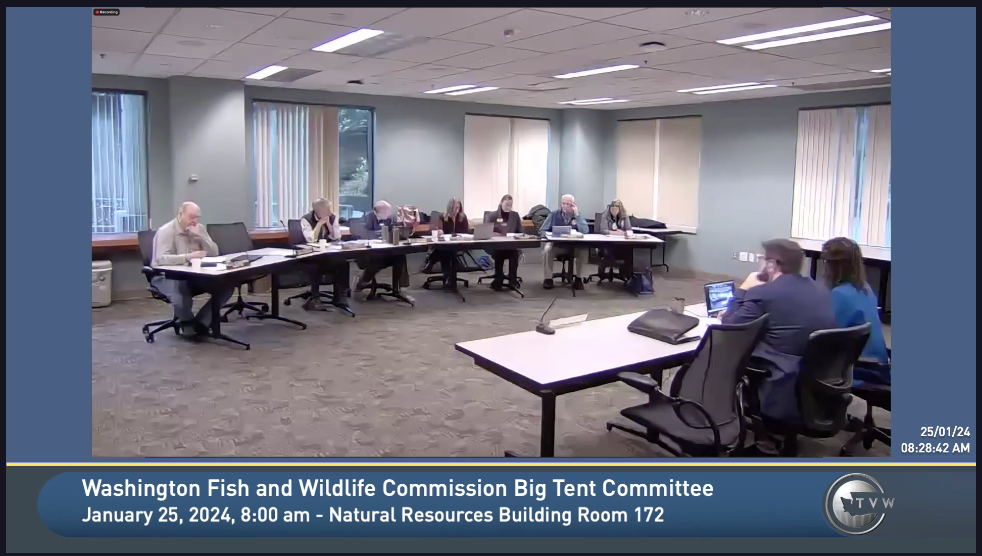
6 Tribes Request Gov-to-gov Consultations On WDFW Commission’s Conservation Policy
The Washington Fish and Wildlife Commission’s push to approve a new Conservation Policy for itself and WDFW appears to be going on pause after six tribes formally asked to consult with the state on the far-reaching guidance document.

The policy had been scheduled for a final decision by the commission tomorrow afternoon and might have passed, but members of its Big Tent Committee this morning agreed to recommend to the full citizen panel on Friday morning that they and the agency first engage in government-to-government consultations on the policy.
Chair Barbara Baker of Olympia said it was a first in her experience to receive such a request.
“We have an issue that the members of the committee will need to discuss,” Baker told fellow commissioners this morning. “We always have issues with this policy, but today the big one is that we have heard loud and clear from the tribes that they would like to engage in government-to-government consultation on this policy. I’ve just been made aware that the Attorney General’s Office has also had a meeting with tribal attorneys, so we need to take that very seriously and respect the tribes’ request, which is stating it mildly.”
That was a reference to letters received this week from the Quileute Tribal Council, Stillaguamish Tribe of Indians, Swinomish Indian Tribal Community, Lower Elwha Klallam Tribe, Lummi Business Council and Puyallup Tribe of Indians, all of whom requested the Fish and Wildlife Commission “stop action on the draft Conservation Policy” until then.
“The proper forum for discussing our respective positions on this draft policy is jointly as sovereign governments, not public comments or even requests to provide tribal comment on a unilaterally developed policy,” the tribal letters state.
Five of the six tribes used the words “severe concerns” about the draft, and they all noted that the word conservation is defined in United States vs. Washington, otherwise known as the Boldt Decision, the 50th anniversary of which is coming up in early February.
“It is inappropriate for the state to develop an ambiguous definition of conservation without engaging tribal co-managers as sovereigns,” the letters state in requesting the commission set up meetings with tribal representatives on the policy before taking any more action.
Previously, Chairman Ed Johnstone of the Northwest Indian Fisheries Commission also twice weighed in on the draft Conservation Policy.
Opening up consultations with the tribes was a no-brainer recommendation from WDFW Director Kelly Susewind.
“For me, it’s pretty straightforward. You said, ‘We’ve heard loud and clear,’ and I would emphasize that that’s the case. This is a pretty strong outpouring from tribes to see this much momentum going. Tribes are our partners in natural resource management. We’ve got a policy within the agency on how to consult with tribes. We have an executive order to consult with tribes. We have the Centennial Accord that says in this state we’re going to work together rather than fighting over these things … For me, there wouldn’t be a choice. I strongly recommend we pause for that consultation with tribes,” Susewind said.

It all amounts to a setback for the wing of the commission and fish and wildlife reformists who have been rushing to pass the policy, as well as serves as an affirmation of the go-it-slower advice the Fish and Wildlife Commission received last October from Nate Pamplin, a Susewind lieutenant and WDFW director of external affairs.
Pamplin, who worked for the Makah Nation and other tribes prior to his current state job, advised the commission to send out updated drafts of the Conservation Policy to tribes across Washington as well as possibly hold state-tribal meetings with them. Between that and further public comment, he suggested that a final decision on the policy could then be held in June.
Pamplin’s counsel was called “absurd. It is absolutely absurd” by Commissioner Melanie Rowland of Twisp, who along with Commissioner Lorna Smith of the Port Townsend area had wanted to fast-track putting the policy in place as early as the end of 2023.
Rowland and Smith are driven in part by concern for a natural world buffeted by climate change and human population growth, but the Conservation Policy has raised eyebrows ever since its September 2021 public introduction for vague and unsettling terms, its need and origin, and the push to implement it.
“When we started this, it was sort of innocent,” stated Baker, one of its authors, this morning. It was an effort, she said, to define the term “conservation,” which appears in WDFW’s 25-year strategic plan 44 times. WDFW already has a conservation policy, but this new one, she has also said, would provide “overarching guidance to inform a variety of Department decisions relative to budget development, setting priorities, and the management of fish and wildlife.”
During the latest round of public comment, which wrapped up earlier this month, those opposed to it said it reflected more of a preservationist mindset than conservation, set unrealistic expectations of being able to reverse loss of fish and wildlife habitat through it, conflicted with legislative mandates to provide angling and hunting opportunities, and that the process needed to be slowed down to better consider concerns around the policy and regain trust that’s been lost, according to summaries in a WDFW presentation to the Big Tent Committee this morning.
Those in favor of it say a conservation-first prioritization is needed and supported using a more cautious approach around natural resource management in these times.
Commenters did appreciate the inclusion of a “Tribal considerations” paragraph that was added in the umpteenth draft of the policy, but that didn’t appear to be enough.

Baker this morning also acknowledged that “nobody else is 100 percent happy with this policy either.”
“Our traditional stakeholders, especially the hunters, are still upset with it, worrying that it will impair their ability to engage in their traditional activities. And the other side of the coin, which I usually call the advocates, they don’t think it goes far enough. So we obviously have more work to do on this policy, and I hate to slow it down, but it doesn’t matter what I think. We have gotten a lot of concern, so I think it is time to slow it down,” she said.
Discussing Baker’s recommendation, committee members Commissioners John Lehmkuhl of Wenatchee, Smith and Rowland all hoped that the tribes would pinpoint specific elements in the policy they didn’t like during the consultations.
Smith and Rowland said they wanted to see tribal consultations wrap up in a few months or before the end of the year – 2024 is an election, after all, and commissioners are appointed by the governor.
And Rowland, a retired federal Endangered Species Act attorney, also termed what happened today a “precedent that is totally open-ended in terms of our workload and how often we will need to do this.”
“Are we going to have independent tribal consultation processes with every policy, rule, guidance – I mean, whatever we vote on?” Rowland said in calling for setting a process around it. Towards that, Lehmkuhl also asked for state executive guidance.
Commissioner Molly Linville of Douglas County said that engaging with tribal comanagers would provide a perspective the commission couldn’t get elsewhere and that a pause would be better for the Conservation Policy in the long run.
“A conservation policy should be a positive thing for everybody because it benefits us. All good conservation benefits all of us, regardless of where we’re coming from. And I think that what happens is, when people view a policy as a stick that they’re going to get whacked with, their knee-jerk reaction is going to be to push back. And I know that’s my personal reaction to this. And so I think this pause is positive on a lot of fronts, that maybe we could come at this a little bit differently with more of a collaborative approach that doesn’t talk about what we’re going to do to you if you don’t get on board with our policy. There’s just a durable peace is, I think, what we should be going for with this conservation policy. And that might sound a little woo-woo-woo, but honestly, policies don’t work if you don’t have that durable peace element that goes along with it. When somebody’s trying to hurry a policy through, I’m going to fight back against it, whether I believe every little piece of the policy, because I’m suspicious by nature. So I just hope that we use this pause as a really great time to get folks back on board and working together, because there’s no reason for this to be negative. And so I’m hopeful and I’m looking forward to the process,” Linville said.
Wise words.
Assuming the full Washington Fish and Wildlife Commission tomorrow concurs with today’s Big Tent Committee recommendation, the panel and WDFW will figure out a process for establishing a process for holding government-to-government consultations with the tribes, Baker said. She nominated herself to work with agency staff, the state Attorney General’s Office and tribal liaisons at both WDFW and the Governor’s Office and said she would keep fellow commissioners posted.
